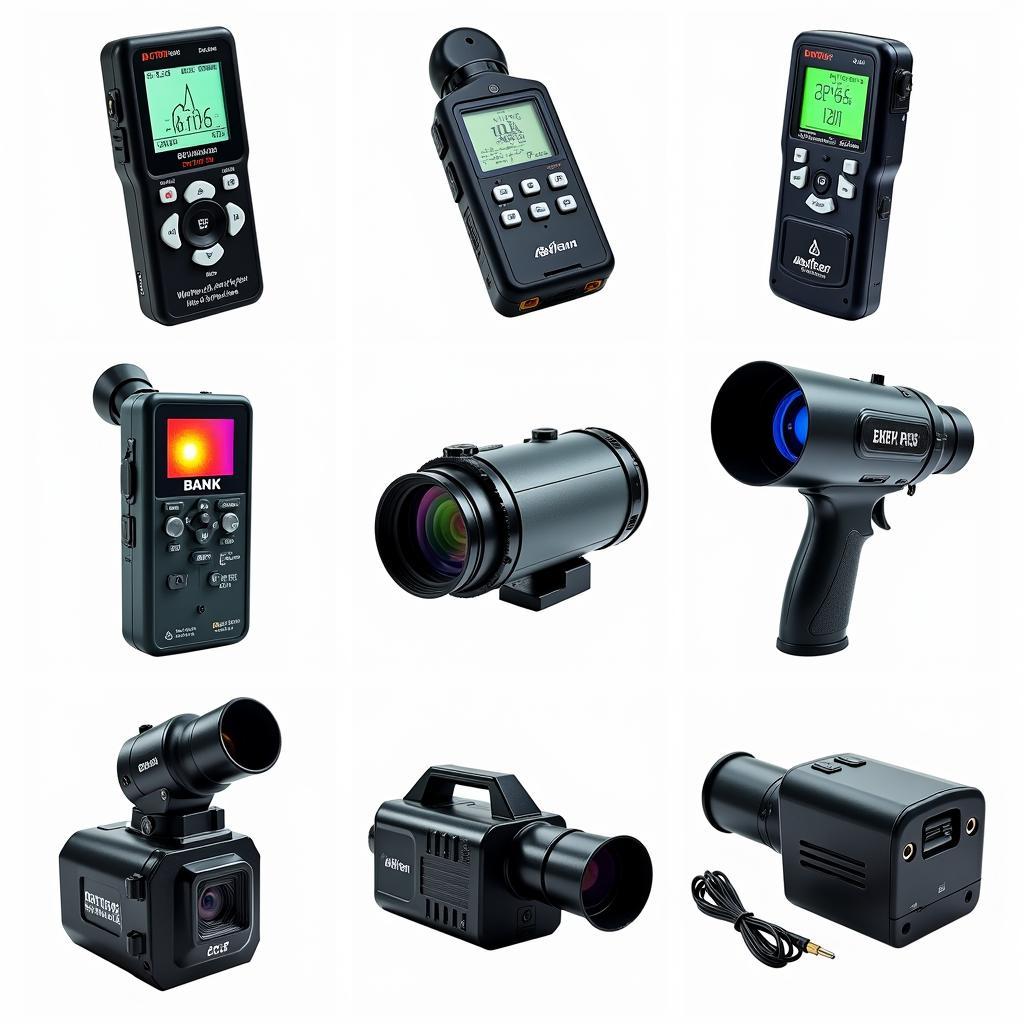Investigative Research plays a crucial role in uncovering hidden truths, whether in the realm of the paranormal or the mundane. It’s a systematic process of inquiry, requiring meticulous attention to detail, critical thinking, and a relentless pursuit of answers. This article will delve into the intricacies of investigative research, exploring its various facets, methodologies, and applications in the paranormal field.  Paranormal Investigative Research Tools
Paranormal Investigative Research Tools
What Makes Investigative Research So Important?
Investigative research goes beyond simple observation. It demands a structured approach to gathering and analyzing evidence, ensuring objectivity and minimizing bias. This is particularly crucial when dealing with paranormal phenomena, where subjective experiences and anecdotal accounts often cloud the truth. By employing rigorous investigative techniques, researchers can sift through the noise and identify genuine anomalies. Why is this so important? Because it allows us to move beyond speculation and build a more accurate understanding of the world around us, including the unseen world that so many find fascinating.
The Core Principles of Investigative Research
- Objectivity: Maintaining an unbiased perspective is paramount. Personal beliefs and preconceptions should not influence the research process.
- Thoroughness: All aspects of a phenomenon should be explored, leaving no stone unturned.
- Evidence-Based Approach: Conclusions should be drawn from verifiable evidence, not assumptions or hearsay.
- Critical Thinking: Every piece of information must be scrutinized, questioned, and evaluated.
- Documentation: Meticulous record-keeping is essential, ensuring transparency and allowing for peer review.
Investigative Research in the Paranormal: A Deeper Dive
Investigative research within the paranormal field takes on a unique dimension. It often involves exploring unexplained events, analyzing eyewitness testimonies, and utilizing specialized equipment to detect anomalies. The cold case investigative research institute focuses on unresolved paranormal cases, applying modern investigative techniques to historical events. This can involve revisiting old locations, examining archived documents, and interviewing witnesses.
Tools and Techniques in Paranormal Investigative Research
While an investigative researcher might use traditional research methods, they also employ unique tools. EMF meters measure electromagnetic fields, EVP recorders capture potential spirit voices, and thermal cameras detect temperature fluctuations, all in an attempt to gather evidence of paranormal activity. These tools, while not foolproof, can provide valuable data when used correctly and interpreted with caution.
How to Conduct Effective Investigative Research
Effective investigative research requires a systematic approach. First, clearly define the research question. What are you trying to investigate? Next, gather preliminary information through background research and literature review. Then, develop a research plan outlining the methodologies and tools you will employ. Conducting interviews with witnesses and experts is often crucial. Analyze the collected data and draw conclusions based on the evidence. Finally, document and share your findings, contributing to the broader understanding of the phenomenon. research apps can be valuable tools for organizing and analyzing data during an investigation.
Common Pitfalls to Avoid
- Confirmation Bias: Seeking out only information that confirms pre-existing beliefs.
- Insufficient Evidence: Drawing conclusions based on limited or unreliable data.
- Lack of Objectivity: Allowing personal biases to influence the research process.
- Misinterpretation of Data: Incorrectly analyzing or interpreting evidence.
Conclusion: The Power of Investigative Research
Investigative research, particularly in the paranormal field, is a powerful tool for understanding the unexplained. By adhering to rigorous methodologies and maintaining an objective perspective, we can unravel the mysteries that surround us. Investigative research empowers us to explore the unknown with a critical and discerning eye, leading us closer to the truth. A research project synonym might be “investigation,” but the core principles remain the same: a systematic and objective approach to uncovering the truth.
FAQ
- What is the difference between investigative research and regular research?
- How can I become a paranormal investigator?
- What are the most common mistakes in paranormal research?
- What kind of equipment do I need for paranormal investigations?
- Are there any accredited institutions for paranormal research?
- What are some ethical considerations in Paranormal Research?
- How can I avoid bias in my investigative research?
Common Investigative Research Scenarios:
- A haunted house with reports of apparitions and unexplained noises.
- A UFO sighting with multiple witnesses.
- A cold case involving unexplained disappearances.
- A historical site with a reputation for paranormal activity.
Further Reading and Exploration:
- Explore our article on l&e research careers.
- Learn more about different research methodologies on our website.
- Discover resources for paranormal investigation and research.
Need help with investigative research? Contact us at Phone Number: 0904826292, Email: research@gmail.com or visit us at No. 31, Alley 142/7, P. Phú Viên, Bồ Đề, Long Biên, Hà Nội, Việt Nam. Our customer service team is available 24/7.